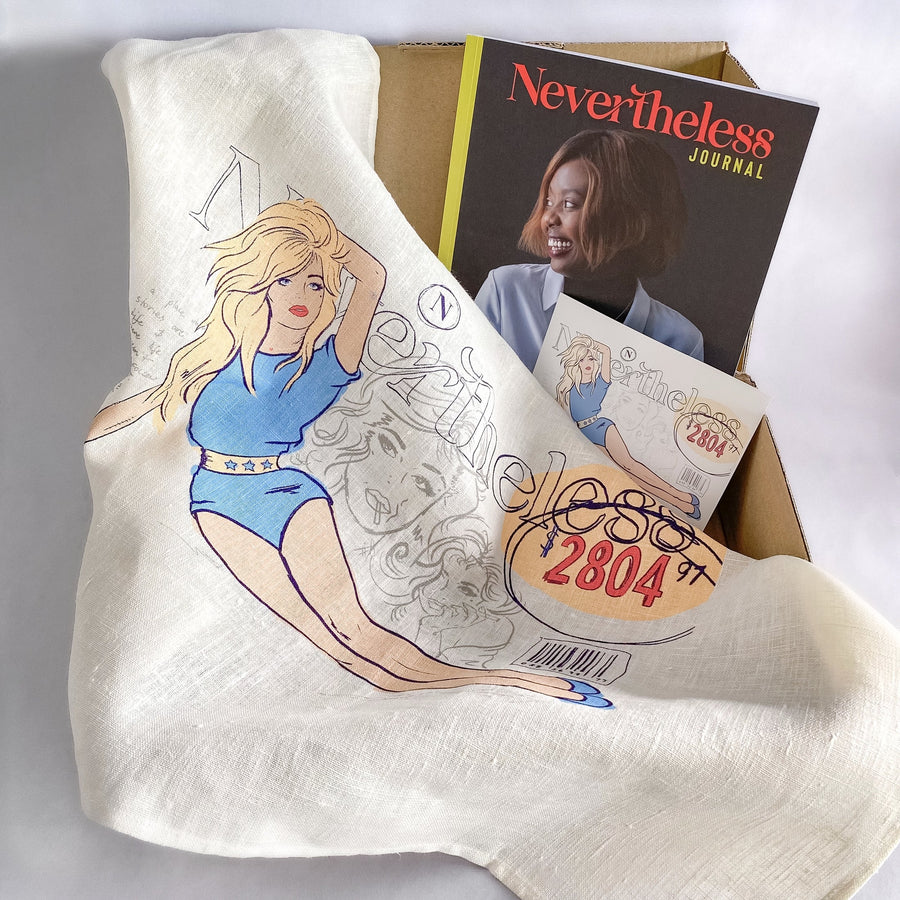Meant to be: Roselle’s community
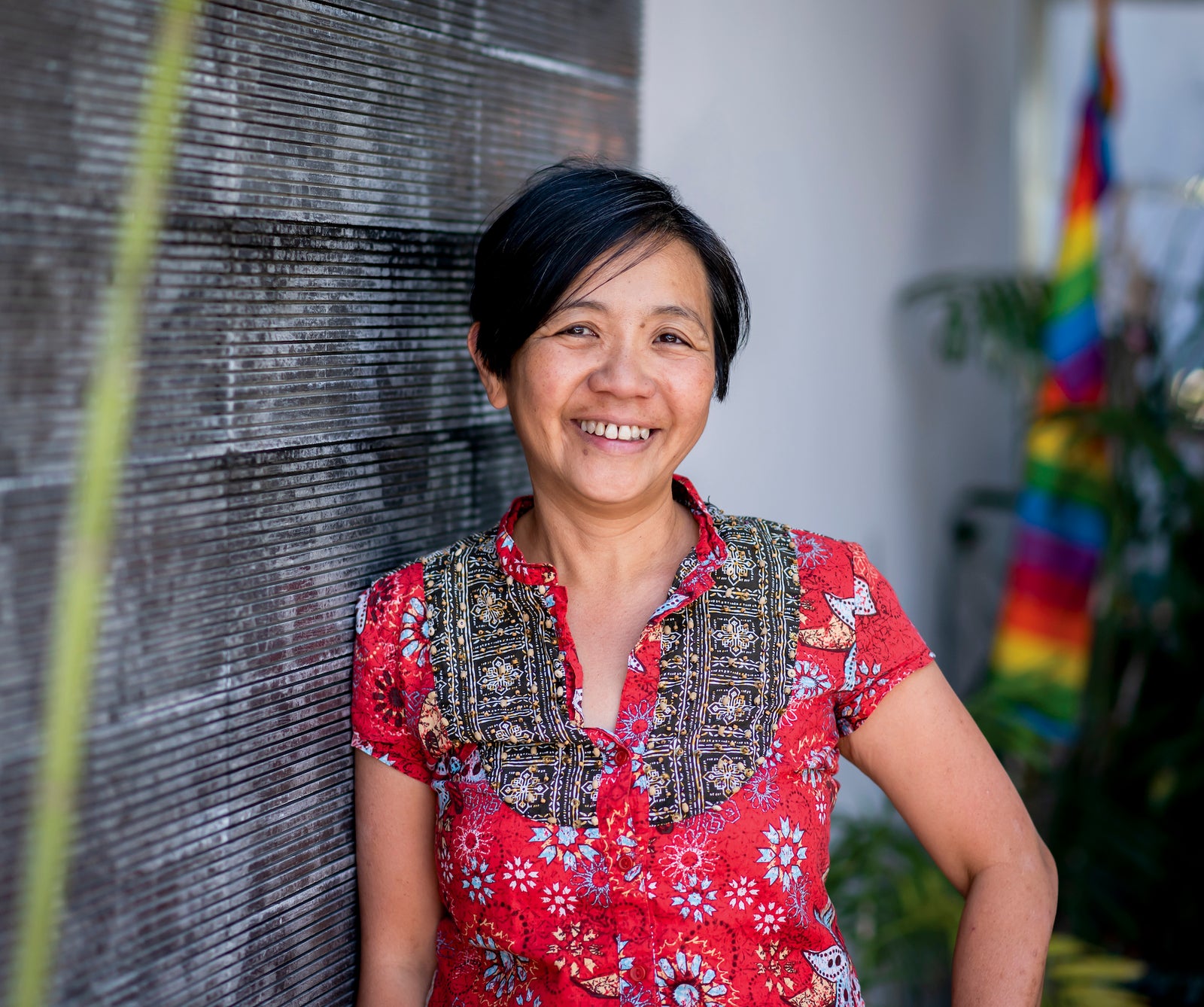
By Natalie O’Driscoll. Photography Simone Gorman-Clark.
Filipino-Australian lawyer, writer and magazine owner Roselle Tenefrancia spent the early part of her career trying to make the world a better place by defending human rights and the environment. Now she’s doing it dinner by dinner.
Growing up in her Catholic Girl’s School in Manila, Roselle probably couldn’t have imagined her life today: living in Australia, married to an Australian, running a boating magazine on the Gold Coast and running pot luck dinners for people from diverse backgrounds. As a matter of fact, she wanted to be a journalist.
The kind of high end metro Manila environment that Roselle was raised in was highly Americanised. Roselle and her peers spoke American English in every class at school except for Filipino class. She still speaks with something of an American accent. As is the case in many countries, the exclusive nature of the Catholic school spoke to status, and the quality of education received.
“It was a very sheltered life,” remembers Roselle. “But still we were taught to think for ourselves, and to do things around the house, like connecting wiring. We learned things without any gender stereotypes. We learned how to take care of our baby sister; she was born when I was ten years old.”
Roselle’s father was obsessed with Reader’s Digest, and had the whole catalogue. The kids would get to choose which book they wanted to read, and loved it. Roselle’s love of reading and writing grew. But by the time she went to one of the best universities in the country, she hit a roadblock.
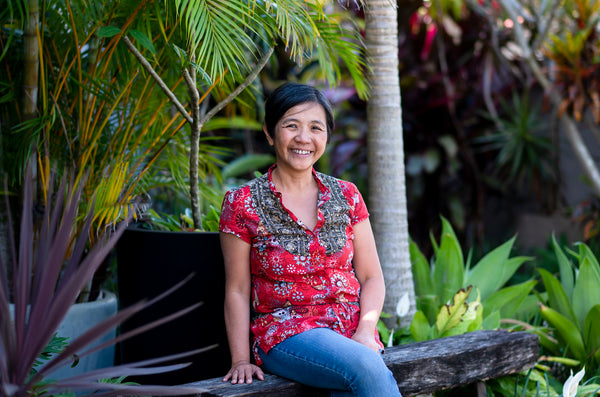
“In uni my writing teacher wasn’t encouraging me,” she recalls. “So I thought I’d become a lawyer instead.”
Immediately Roselle was exposed to human rights lawyering, Indigenous people’s rights, human rights and farmer’s rights.
“And it occurred to me that this was my way and what I wanted to do. Plus I’d get to travel a lot,” she laughs.
“When I passed the bar I immediately decided that I should go straight to something that’s about the community, so I worked with my friend who is in the Department of Social Welfare in the Philippines. On the side I was doing research and volunteering.
The government was Roselle’s first stop, even though all of her friends were following the money into corporate law.
“A friend said to me ‘I know you, and if a senior partner tells you to do something that you obviously don’t agree with, would you still do it, or would you say no?’
“I said ‘no, I won’t do it’.” My friend knew that what’s my answer would be. I knew I wasn’t for a law firm.”
Roselle entered into legal aid.
“In the Philippines, you can to ask any type of assistance,” she says.
“All government offices are open to all people. There’s no specific thing you can’t go to. If you need money for a funeral, political officers offices they can’t say no. Same thing with the legal help we were giving.”
After that she entered into environmental law, a branch frequently connected to Indigenous rights.
“I started travelling again to remote places, far-flung places where Indigenous peoples were living. Most of the cases we had were anti-mining cases.
“People would walk from hundreds of kilometres away to be at these meetings. Often there were no roads. And they’d come and meet with the lawyers, anthropologists, livelihood experts and forest arrangers, who know the environment and can be consulted legally on the pros and cons of burning, when planting should happen based on the rules of the rangers etc.”
After three years of this fascinating work, Roselle was headhunted by a friend to do human rights monitoring under her own private practice. This is where she got experience going up again some big guns.
“Being this small lawyer against a big firm… they’re wondering how you can even be negotiating with them. Corruption and all of that was scary. They offer you money to make your principles go away.”
Ever stalwart in her values, Roselle stayed true to her path, even though sometimes it got dangerous.
“They needed people on the ground to be checking human rights violations. I was head of a secretariat team that went to remote places where there’s always this sort of abuse of the government.
“We were independent monitors, so we had to watch out, both for the rebels and for the police. They’d sometimes come to our hotel rooms. You had to remain neutral because either party can take advantage.
“My parents were always worried about where I was going and if it was safe. We couldn’t ask protection from the government because we couldn’t side with anyone.
“But I just found it fun and exciting, being single at that time as well.”
After years more work in Indigenous land rights, sustainability and a lot more travel, Roselle decided she needed a serious break. So she took off to the island of Boracay.
“There was nothing there I could do really, maybe just a bit of writing. I was doing a lot of lifestyle writing on the side, even contributing stories, which I could do from anywhere. That’s what I was doing while I was on the island.
“But I knew people from there, they knew who I was, my background, and of course I got involved in community programs, environmental, the community and would consult,” she laughs and shakes her head.
“That’s where I met my husband Andy.”
They lived there for a couple of years, just enjoying life. But when their son Aram was born, they started thinking about schooling, hospitals, flying back and forth from Manila, and decided to make the move to Australia instead.
Roselle was doing a lot of writing for a lot of different publications in the Philippines, and Andy was in love with boating, so they decided to put their interests and skill set to good use and create a boating magazine. Enter Boat Gold Coast. As it turned out, Roselle’s writing teacher couldn’t have been more wrong.
But although she wasn’t working in human rights anymore, Roselle couldn’t shake her need to help out in the community. Just how to do it, was the question.
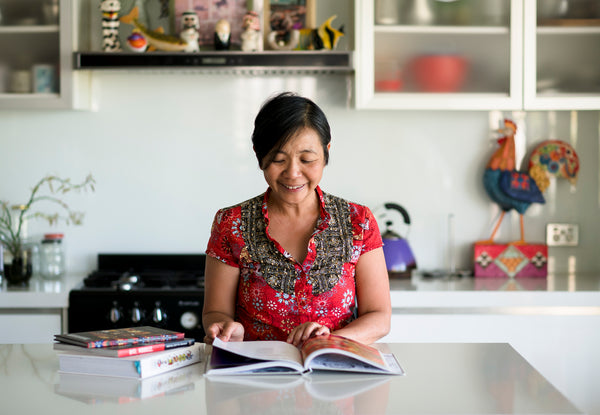
By chance, she discovered a flyer for the Welcome Dinner Project. It’s a nationally run project designed to welcome refugees into your suburb. You invite people into your home and ask everyone to bring a dish.
She became a facilitator and started running the events in her local area. But when Covid hit, the project could no longer work because of all the restrictions. Victoria was in full lockdown so the national management team couldn’t monitor the events.
“So I just decided to do it myself,” says Roselle. Queensland was under fewer restrictions at the time, so she connected with a group called the Artist Hub that ran out of a local gallery, and set up her own Art & Pot Luck dinners in order to connect the community.
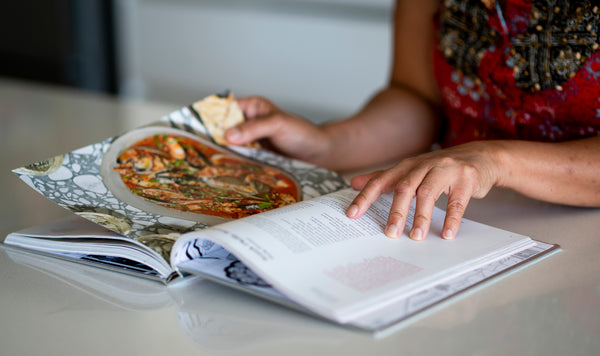
The events were very successful, with guests coming back over and over.
“For me as a migrant I feel they’ve helped me a lot,” she says.
“It has helped reaching out to the community and I’ve learned a lot from different people, and as a migrant that’s what I need, to reach out to people and be comfortable reaching out to them. And I think a lot of migrants don’t have that.
“First you just sit down and talk about the food, through food it’s easier. And if you see someone confident enough to talk about your own life, maybe you will feel confident enough to talk about your own life.
“I’ve had someone tell me it’s the first time she’s ever felt like she’s a part of the community. Going to that, even monthly, she has something to look forward to.
“I think Covid is one of the things that has made us realise we have isolated ourselves. And we don’t meet the people who would be interesting to meet, because they’re not in our circles, and we don’t make an effort to go outside them, so we won’t meet them.
“What’s in my past, I don’t have to erase it. I just have to be strong and put myself out there, and just do it. That’s one of the things that have helped me to survive the last ten years.”
Read Roselle's feature and other stories of persistence, passion and purpose in Nevertheless Journal Two. Order your copy now!
